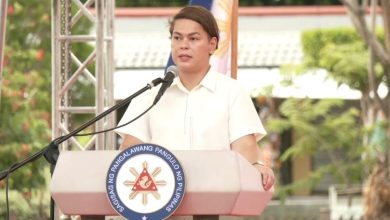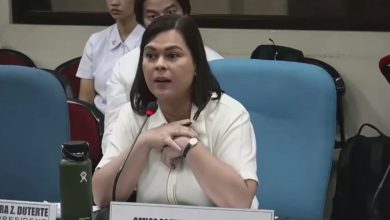The Supreme Court (SC) on Tuesday started the three-day oral arguments on the three consolidated petitions challenging the constitutionality of President Rodrigo Duterte’s proclamation of martial law in Mindanao.
The three consolidated petitions were filed by opposition lawmakers led by Albay Rep. Edcel Lagman, local Mindanao leaders led by Lumad leader Eufemia Campos Cullamat and a group of women from Marawi led by Norkaya Mohamad.
During the oral arguments, Lagman said that that there is no sufficient factual basis that warrants the implementation of martial law in the entire Mindanao region
Associate Justice Mariano Del Castillo questioned Lagman on his basis for claiming that the situation in Marawi does not necessitate martial law in Mindanao considering that he did not personally visit the city to know the actual situation there.
“So it would really (be) difficult to say that the situation there does not amount to rebellion. I mean you have not been there, you have not been on the ground. You don’t know what the situation is there. How can you dispute now the findings of the sufficiency of the factual basis for the proclamation?” Del Castillo asked.
Del Castillo noted that President Duterte has access to the government’s vast intelligence network.
Lagman, however, said there is no need for the petitioners to be in Marawi since their review of the report submitted by the President to the House and the Senate already revealed insufficiency of factual basis for such declaration.
“To question the issuance of Proclamation No. 216, the petitioners need not be in Marawi City before, during and after the proclamation because the assessment and review whether there is sufficient factual basis for the declaration is the Presidential proclamation itself and the report to the Congress.., Based on the presidential proclamation and the report to Congress we submit your honor that there is no sufficient factual basis for the declaration of martial law,” Lagman said.
He noted that the facts stated in the report turned out to be false or inaccurate.
Under Article VII, Section 18 of the 1987 Constitution, the President may declare martial law and suspend the writ of habeas corpus only “in case of invasion or rebellion, when public safety requires it”.
The same section also grants special jurisdiction to the Supreme Court to review the “sufficiency of the factual basis” of such declaration or suspension.
Senior Associate Justice Antonio Carpio also questioned Lagman if there is actual rebellion happening in other areas in Mindanao.
He noted that under the Constitution, there must be an actual rebellion for martial law to be declared.
“You said that in rebellion, there should be an actual rebellion for martial law to be declared. Can you point to any incident that in the Agusan provinces that there was rebellion?” he asked during interpellation, to which Lagman responded with “no, your honor.”
“Under the present Constitution, there must be actual rebellion,” Carpio stressed, citing the absence of rebellion in other provinces covered by the proclamation.
Lagman agreed and explained that imminent danger in the other provinces in Mindanao cannot be basis for their coverage in the martial law declaration.
Carpio also pointed to the martial law provision in the 1987 Constitution, which allows the SC to “review, in an appropriate proceeding filed by any citizen, the sufficiency of the factual basis of the proclamation of martial law or the suspension of the privilege of the writ or the extension thereof, and must promulgate its decision thereon within thirty days from its filing.
For his part, Associate Justice Marvic Leonen, said that martial law “should have clear operational guidelines because it’s not simple declaration but, rather, it has real effects.”
Leonen noted that the SC has the power to review the declaration and should not give full deference to the chief executive and dismiss the petitions on technicalities.
Associate Justices Lucas Bersamin and Estela Perlas – Bernabe cited the presumption of validity of the declaration by the President, who should be given reference on the matter as the Commander-in-Chief, and both put on petitioners the burden to prove the grave abuse of discretion on the part of the President.
Marlon Manuel, legal counsel of a group of women from Marawi, who also argued for the petitioners, insisted that the military forces can quell the ongoing atrocities in Marawi without the need for Proclamation 216.
“Under the 1987 Constitution, martial law must be an instrument of last resort. If there is a remedy less severe than martial law, such less severe remedy must be resorted to. Only when there is a showing that the situation cannot be contained unless martial law is declared, can the use of such extraordinary power of the President be justifiable,” he said.
Because of these grounds, petitioners asked the SC to exercise its review power and strike down the proclamation.
Meanwhile, Solicitor General Jose Calida, who is present in the oral arguments immediately rebutted the allegations of petitioners and maintained that there is a rebellion with the Maute group and other terrorist group to strip the government of control in southern Philippines
“Sino ba ang Filipino na naniniwalang hindi rebellion ang nangyayari sa Marawi. All the elements of rebellion are present—public uprising, allegiance to ISIS (Islamic State in Iraq and Syria),” Calida told reporters.
He reiterated that there is rebellion because “ISIS-inspired local rebel groups have taken arms against the Philippine government for the purposed of removing Mindanao from its allegiance, and of depriving the Chief Executive of his prerogatives therein.”
“They [Maute] are depriving the President of exercising his prerogatives as commander-in-chief,” Calida said.
Calida hinted that he will reveal an information on the matter once its his turn to speak before the high court.
“My lips are sealed until tomorrow. Every hearing, I have a surprise,” Calida said.
The oral arguments will continue at 10 a.m. on Wednesday with the continuation of interpellation by the justices on the petitioners.
Two other petitions were filed by separate groups led by former senators Rene Saguisag and Wigberto Tañada both seeking issuance of a mandamus that would compel Senate and the House of Representatives to convene jointly to review the declaration. The SC has yet to act on these petitions.
Last Thursday, the SC consolidated the two mandamus petitions asking the high court to order the Senate and the House of Representatives to convene in joint session and vote jointly on President Duterte’s Proclamation 216 declaring martial law and suspending the writ of habeas corpus in Mindanao.
President Rodrigo Roa Duterte issued Proclamation No. 216, on May 23 declaring a state of martial law and suspending the privilege of the writ of habeas corpus in the whole of Mindanao. This was a result of the attack of the Maute group in Marawi City, which is still ongoing and is subject to military operations. (PNA)
credit: Bombo Radyo



